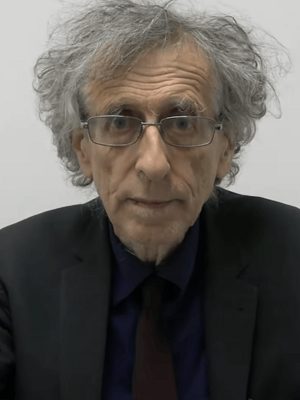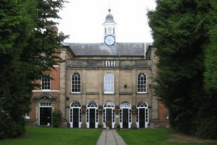Piers Corbyn facts for kids
Quick facts for kids
Piers Corbyn
|
|
|---|---|

Corbyn in 2020
|
|
| Born |
Piers Richard Corbyn
10 March 1947 Chippenham, Wiltshire, England
|
| Occupation | Weather forecaster, businessman, anti-vaccination activist |
| Relatives | Jeremy Corbyn (brother) |
| Academic background | |
| Education | Castle House School Adams' Grammar School |
| Alma mater | Imperial College London Queen Mary University of London |
Piers Richard Corbyn (born 10 March 1947) is a British weather forecaster, anti-vaccine activist, conspiracy theorist, and former politician.
Born in Wiltshire, Corbyn was raised in Shropshire where he attended Adams' Grammar School. He was awarded a first class BSc degree in physics from Imperial College London in 1968 and a postgraduate MSc in astrophysics from Queen Mary College, University of London, in 1981. Corbyn was a member of the Labour Party and served as a councillor in the London Borough of Southwark from 1986 to 1990. He is the elder brother of former Labour Party leader Jeremy Corbyn, leaving Labour due to his opposition to the Iraq War.
Corbyn ran a weather monitoring company called WeatherAction in the 1990s and gained some prominence in the media for his predictions and, later more so, for his rejection of the scientific consensus on climate change.
Throughout the COVID-19 pandemic, he was a prominent proponent of conspiracy theories. He described SARS-CoV-2 as a "hoax", frequently campaigned against lockdowns and against COVID-19 vaccines, and described COVID-19 vaccines as dangerous. Corbyn was arrested on several occasions for taking part in protests against public health laws, and for calling on supporters to commit violent acts against members of Parliament.
Contents
Early life and education
Piers Corbyn was born on 10 March 1947 in Chippenham, Wiltshire. He grew up at Yew Tree Manor in Pave Lane, in Newport, Shropshire, a 17th-century country house which was once part of the Duke of Sutherland's Lilleshall estate. He began recording weather and climate patterns in 1962 at the age of fifteen, constructing his own observation equipment. He attended Castle House School and Adams' Grammar School in Newport, Shropshire. At 18, he went to Imperial College London, being awarded a first class BSc degree in physics in 1968. He commenced postgraduate research there into superconductivity, but then went into student representation and politics for some years. In 1979, he returned to postgraduate study at Queen Mary College, University of London, being awarded an MSc in astrophysics in 1981. While he was an undergraduate, an article by Corbyn was published in the Royal Meteorological Society's magazine Weather discussing a brine barometer and an electrical thermometer.
Student representation
In 1969, Corbyn became the first president of the Imperial College Students' Union to be directly elected by the student body. As president until 1970, Corbyn was successful in establishing a sabbatical union president, enabling the elected student leader to be registered at the college without having to study or pay fees (in fact they received a grant from the college and union).
Corbyn set up a short-lived Imperial College Representative Council, seats on which were distributed between members of the college on the basis of their numbers, a system that almost gave students a majority. The ICAUT, a staff union, refused to cooperate with this student-led initiative. Although this particular council did not survive, increased student representation on college boards and committees became, like the sabbatical president, a lasting success of Corbyn's time as ICU president.
Corbyn, together with the rector at the time, Lord Penney, received the Queen when she opened a new administrative building in 1969. During the visit Corbyn petitioned the Queen in front of 900 people, asking for students to be given greater say in the governance of the college.
Housing rights
Corbyn was a housing and squatters' rights activist in the north Paddington area of the City of Westminster in the mid-1970s. In 1974, he stood for election to Westminster City Council in Harrow Road ward as a Squatters and Tenants candidate; in 1978, he and a colleague stood in Harrow Road as Decent Housing candidates. In the 1977 GLC election he was the International Marxist Group candidate for Lambeth Central. He and some of the squatters in Elgin Avenue were, as a result of their campaign which included the building of barricades against eviction, rehoused by the GLC in 1975 spread out between Westminster and other London boroughs to discourage the risk of further united action. He later moved from that rehousing in Rust Square to the Alvey Estate in Southwark where he became a leader of the tenants association.
Career
Party politics
Corbyn was a member of the Labour Party. He was elected as a Labour councillor for Burgess Ward of the Southwark London Borough Council in 1986 but lost in 1990. In 1987, Corbyn was arrested for the defacing of an SDP–Liberal Alliance poster, but cautioned and released without charge. For seven years he was an unpaid campaigns organiser in Southwark and Bermondsey, being thanked by Tony Blair in 1998 at Downing Street. Corbyn left the Labour Party in 2002 in the run up to the invasion of Iraq, and stood as an independent candidate in 2002 and in a 2015 council by-election. According to The Sunday Times in September 2017, his attempt to rejoin the Southwark Constituency Labour Party in January 2017 was blocked.
His brother, Jeremy Corbyn, was elected MP for Islington North in 1983, was re-elected in every following election as of 2023[update], and served as Leader of the Labour Party and hence Leader of the Opposition from 2015 to 2020. In August 2015, Corbyn supported his brother's campaign in the Labour Party leadership election, on the basis that he stood for proper debate and accountability, including on climate. On Twitter, he urged people to register to vote and back Jeremy Corbyn to lead the Labour Party.
WeatherAction
Following some years of weather prediction as an occupation, he formed WeatherAction, a business, in 1995. WeatherAction is the business through which Corbyn sells his predictions. He has in the past bet on these predictions. His betting attracted much interest in 1990, when his predictions of severe weather were met by a year of the "worst extremes".
WeatherAction was formerly listed on the Alternative Investment Market (AIM) as 'Weather Action Holdings plc' in 1997, and was transferred back to private ownership in 1999, primarily because of sustaining increasing losses and the impact of annual £70,000 costs related to listed status on annual revenues of £250,000. Corbyn reacquired the weather prediction business; the listed shell was taken over by investors and changed its name to 'InternetAction.com', with the intent of researching potential net-based takeover targets.
WeatherAction left the Alternative Investment Market in 1999 after reported losses of £480,000 incurred during its time as a public company; its share price dropped from 79p a share to 24p.
Prediction methods
Corbyn's technique is stated to combine "statistical analysis of over a century of historical weather patterns with clues derived from solar observations." He considers past weather patterns and solar observations and sun-earth magnetic connectivity. However, meteorological studies show that such influences cause minimal impact on the Earth's atmosphere.
Scientific review
The only study involving Corbyn's work published in a peer-reviewed journal was in the Journal of Atmospheric and Solar-Terrestrial Physics (2001). Its investigation was limited to Corbyn's "likely damaging gale periods" predictions for the island of Great Britain for the period October 1995 – September 1997. Corbyn's enlisted work (carried out for a consortium of insurance companies) was only for the most likely periods of the strongest winds and specifically not a full forecast to include lesser winds:
Forecasts prepared by WeatherAction would repay further attention. The results provide little evidence to dismiss the observed success rates as being attributable to mere chance or good fortune. Indeed the balance of evidence indicates that the system performs better than chance although it is recognized that the margin of success differs greatly between the seasons and is lowest in winter when gales are most frequent.
This analysis has been wholly empirical in nature, seeking only to establish the success levels of the gale forecasts. Other aspects of the forecasts have not been considered in this evaluation. Inevitably however these results draw into the debate questions surrounding the methodology by which the forecasts are prepared. This is not, however, the arena in which such issues should be taken up.
In a 1999 edition of Wired magazine, researchers Ian Jolliffe and Nils Jolliffe stated of Corbyn's predictions that: "It is unusual for most of the detail to be completely correct, but equally it is rare for nearly everything to be wrong… Some forecasts are clearly very good, and a few are very poor, but the majority fall in the grey area in between, where an optimistic assessor would find merit, but a critical assessor would find fault."
In a 2012 article in Wired titled "The Fraudulent Business of Earthquake and Eruption Prediction", Erik Klemetti, an assistant professor of Geosciences at Ohio's Denison University accused Corbyn of "cherry-picking" and said people who claimed to be able to forecast earthquakes were "faith healers of the geologic community and should be seen as such."
Let London Live
In January 2021, it was announced that Corbyn would stand for his own party, Let London Live, in the 2021 London mayoral election and 2021 London Assembly election. On 19 April, Corbyn told the BBC that if he were to be elected then he would "end lockdown on day one as mayor". He finished 11th with 20,604 votes (0.8%) in the mayoral election, while his party finished 12th on the London-wide list with 15,755 votes. He stood for Let London Live in the 2022 Southwark London Borough Council election.
He stood as a candidate in the 2023 Uxbridge and South Ruislip by-election for Let London Live; Corbyn finished 11th of 17 candidates, receiving 101 votes (0.3%), behind the novelty candidate Count Binface who received 190 votes.
See also
 In Spanish: Piers Corbyn para niños
In Spanish: Piers Corbyn para niños
- Protests over responses to the COVID-19 pandemic § United Kingdom



